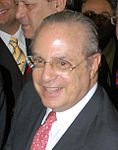Brazilian presidential election, 1985
|
|
||||||||||||||||||||||
|---|---|---|---|---|---|---|---|---|---|---|---|---|---|---|---|---|---|---|---|---|---|---|
|
||||||||||||||||||||||
|
||||||||||||||||||||||
|
||||||||||||||||||||||
The 1985 Brazilian presidential election was the last to be held indirectly through an electoral college, and the last to be held under the Military Regime. The electoral college system was put in place so that the military elite that controlled the government could secure the election of the candidate chosen by the High Command of the Armed Forces as President. However, in 1985, due to the process of negotiated transition to democracy that started in the late 1970s, the politicians in the electoral college were placed under no coercion, and were allowed to choose the president of their choice.
Under the 1967-1969 Constitution enacted by the military, the electoral college was composed of all the members of the Brazilian bicameral National Congress (formed by Senators and Federal Deputies) and also of a number of State Deputies who were especially elected by their peers in the State Assemblies for the purpose of serving as delegates of those Assemblies in the electoral college. The 1982 legislative elections had already taken place under the process of gradual restoration of democratic freedoms, and the opposition had a slim majority of seats in the Chamber of Deputies, but the governing party, allied with the Military Regime, still controlled the Senate (only a fraction of the composition of the Senate had been up for election in 1982, other sentators had been elected indirectly in the late 1970s).
Two groups were disputing the succession of President João Figueiredo: the Democratic Alliance and the Democratic Social Party. The Democratic Alliance, which advocated the restoration of democracy through the creation of a new Constitution, launched the candidacy of Tancredo Neves from the Brazilian Democratic Movement (MDB). The MDB led the Alliance and was supported by the Liberal Front, a dissidence of the Democratic Social Party, and the Democratic Labour Party.
...
Wikipedia


